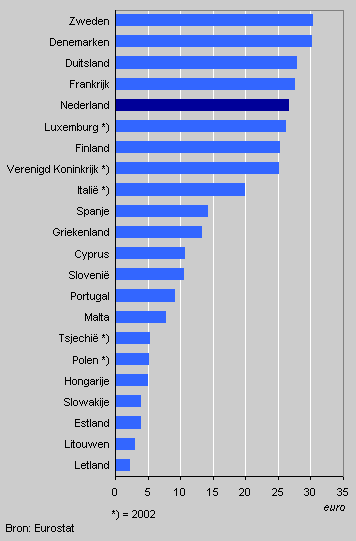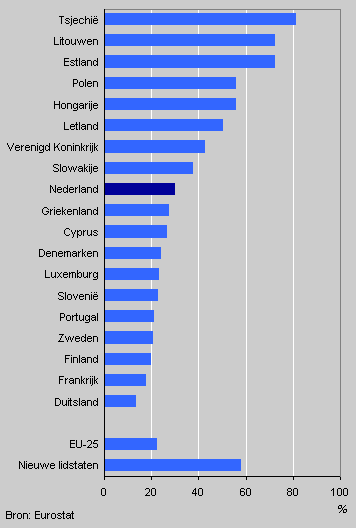Dutch labour costs in line with Western Europe

In 2003 the average labour costs per hour worked for enterprises in The Netherlands reached close to 27 euro. In recent years Dutch labour costs have always been always above the EU average. However, labour costs were even higher in several other Western european countries such as Sweden, Denmark, Germany and France. They were considerably lower in the new EU member states.
Labour costs differences in the EU
The european Union can be divided into three groups as far as labour costs are concerned. They are highest in the West-European countries. In Sweden and Denmark labour costs per hour worked come to over 30 euro. The Netherlands, with 27 euro per hour worked, takes up a middle position.
The Mediterranean countries form the middle group, where labour costs per hour worked vary from almost 8 euro in Malta to about 20 euro in Italy.
The third group consists of Eastern european member states where the labour costs are considerably lower. In the Baltic States, Estonia, Latvia and Lithuania the labour costs per hour worked came to 3 to 4 euro.
Labour costs per hour worked in the EU, 2003

Largest increase in labour costs between 1997 and 2002
In the Netherlands, labour costs increased by over 30 percent between 1997 and 2002. The increase was above the EU average and due to the tight job market in the late 1990s. In 1997 Dutch labour costs were relatively low by Western European standards. In 1997 Dutch labour costs were well over 4 euro less than in Germany. In 2002 the difference was reduced to about 1.5 euro per hour worked.
The United Kingdom was the only country with a greater increase in labour costs among the Western european countries between 1997 and 2002. Part of the increase was due to the value increase of the British pound on the euro.
Labour costs, 1997-2002

In 2003 Dutch labour costs increased by over 4 percent. This was more than in Germany and France where the increase was barely 3 percent, but less than in Sweden where the increase was 6 percent.
New member states catching up
The labour costs in the new EU member states are rapidly increasing. The Czech Republic is in the lead: labour costs per hour worked increased by over 80 percent between 1997 and 2002.
Herman Slagter and Mark Zuiderwijk